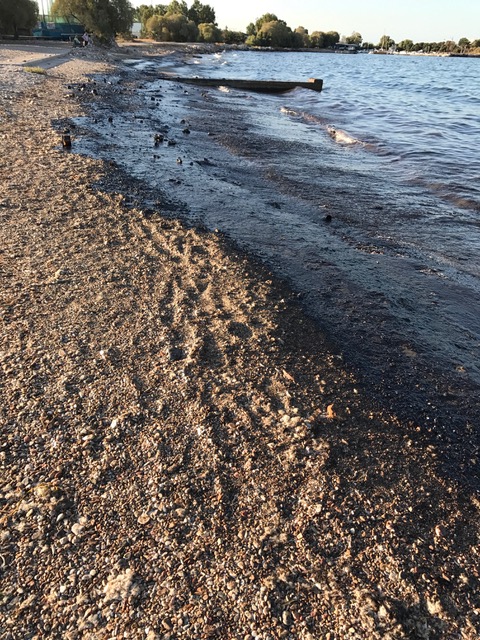The clean-up operation will have to include the emptying of the tanks of the sunken vessel, which still contain 2,570 tonnes of fuel.
The smell of petroleum and tar is quite sharp in Salamina, and many residents are suffering from breathing difficulties and problems with their vision as their eyes are red and sting.
This is a huge environmental disaster and the images of sea birds blackened with oil are heartbreaking.

By Tuesday the oil slick had been swept by the wind as far as Piraiki, a coastal suburb of Piraeus. By Wednesday morning it had reached the coast where we are. Yesterday we could see pollution control vessels patrolling the area by our beach.
This morning our coast is a devastation area.
The distance from Salamina to our coast is 21 kilometres. The mountain range in the distance on the left of this photograph is Salamina.
All of the beaches in our area are cordoned off today. The following images taken by Ken, show the devastation wreaked across our beaches, including the one we use everyday.
Three hours after Ken had taken his photos I went out too, and visited some of the beaches in our area.
This beach was cordoned off
as was this one.
Tar by the tram stop
Black oil by the umbrellas on the beach
In Agios Kosmas the clean-up operation was in full swing

I heard someone say that after the clan-up, this beach is in a much better condition today, but, of course, much more will be washed up on the shore in the coming days and weeks.
My intention was to move on to the beach where Ken took his photographs, which is the one that is the most affected, but I got an asthma attack induced by the stench and chemicals, so I turned back and came home.
On a personal and purely selfish level, I am heartbroken that we will not be able to swim again this summer, but it's a minor concern given the extent of the devastation to the Saronic Gulf, the creatures that live in it, and the whole of the eco system. They say that it will take four months for this to go away.
It's time to end the age of oil, and oil spills. It is time to recognise that oil, and fossil fuels in general, are destroying our world. This year was the hottest year on record; we witnessed the massive devastation the hurricanes Harvey and Irma unleashed. It is time to expose a programme that relies on robbing the future to fuel the present. It is time to expose the 25 companies that have produced more than half the greenhouse gas emissions humans have released since the start of the Industrial Revolution. These companies have spent millions sponsoring climate deniers. It is time to question the ideology that puts profit before the welfare of people on this planet. This is our wake-up call.
















The price we pay for the advances of civilisation. As long as we use bulk transportation, cars, air conditioning, electricity in general, divers consumables ... and wanting them at as cheap a monetary price as possible and closing our eyes to aspects of disposal, thus long we and the earth's other inhabitants shall have to pay the price in other ways. And inevitably those who pay the greatest price are those who received the least benefit. Hey ho - the way of our world.
ReplyDeleteThere are other ways though. Solar and wind power for instance: wind power is more economical for the first time this year. If and when the switch will come will depend on the financial interests of the big companies though. We need to keep on pushing....
ReplyDeleteI completely agree that we should be making increasing efforts to harness natural power, and am delighted that wind power is doing so well. Battery design is developing too - there was an interesting episode of Costing the Earth on R4 this last week on how Cornwall is making attempts to become powered completely by renewables. We are where we are, however, and for quite a while during transition, especially if folks continue to want everything as cheaply as possible, there are bound to be disasters of one kind or another. Sadly. I believe that the more that we as individuals do ourselves the faster the changes will come. It was heartening to read in your next post of the water dispenser in Katapola.
ReplyDeleteOlga, I wish I was as optimistic as you are about the future. I think that there are such powerful financial interests behind fossil fuels that change might not come about until it's too late. Science has proven over and over that climate change is upon us, and yet world leaders are doing very little about it and now the United States have withdrawn support for any action on climate change. I fear that our world is driven by profit and short-term economic gains which unfortunately lead to the destruction of our forests, oceans and the land. However much individuals become aware and do their bit, not much will change unless governments take the initiative. I despair...
Delete